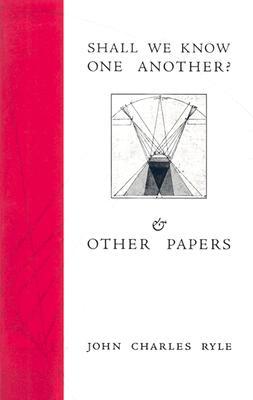- Biblia
- Leer la Biblia
- Versiones de la Biblia
- Verso del dia
- Planes de lectura
- Versos por tema
- Books of the Bible
- Imágenes De La Biblia
- Estudio
- Comentarios
- Concordancias
- Diccionarios bíblicos
- Enciclopedias bíblicas
- Sermones
- Bible Atlas & Maps
- BP Wiki
- Devocionales
- Devocionales de hoy
- Light of the World
- Todos los devocionales
- Inspirational Quotes
- Más
- Picture Quotes
- Videos
- Inspirador
- Estudio Bíblico
- Lo que dice la Biblia
- Bible Q&As
- Daily Bread
- Bible by Genre
- Bible Stories
- Random Bible Verse
- Comunidad
- Store
Shall We Know One Another?: & Other Papers
by J.C. Ryle
For J.C. Ryle (1816-1900) the question Shall We Know One Another? was a heartfelt inquiry of one who buried three wives. His first wife, Matilda, died after less than two years marriage, when he was thirty-one. Two-and-a-half years later, he married his second wife, Jessie, only to lay her in the grave within ten years. His third wife, Henrietta, died after twenty-seven years of holy matrimony, when he was seventy-two. Well could he write, "The closest relation on earth -- the marriage bond -- has an end." The Other Papers of this volume reveal both the narrow lens and broad scope of a biblical worldview. From planet Earth to Christian contentment, and from Nero's household to words for women, a wide spectrum is considered -- all centered in Christ. This booklet (first published in the nineteenth-century "Little Gem" series) answers not only the original question but many other uncertainties faced in life, offering pearls of wisdom from Ryle's pastoral treasure chest. And there is no nugget too small, for as Ryle said, "I call nothing little which tends to make religion more beautiful in the eyes of the world. Little arrangements make all the difference inthe appearance of a room; little adornments make all the difference in the looks of a bride; little attentions make all the difference in the comfort a master feels in a servant. I am very jealous for my Master's cause. Anything, anything, to make it more lovely before man!"
BUY NOW
Paperback, 64 pages
Published March 1st 2003 by Charles Nolan Publishing (first published December 1st 2001)
© 2026 Bibleportal.com Reservados todos los derechos.

J.C. Ryle (1816 - 1900)
J.C. Ryle was a prolific writer, vigorous preacher, faithful pastor, husband of three wives, [widowed three times: Matilda died in 1847, Jessie died in 1860, Henrietta died in 1889] and the father to five children [1 with Matilta and 4 with Jessie]. He was thoroughly evangelical in his doctrine and uncompromising in his Biblical principles. In 1880, after 38 years in Pastoral ministry in rural England, at age 64, he became the first Anglican bishop of Liverpool. He retired in 1900 at age 83 and died later the same year at the age of 84.“He [J.C. Ryle] was great through the abounding grace of God. He was great in stature; great in mental power; great in spirituality; great as a preacher and expositor of God’s most holy Word; great in hospitality; great as a writer of Gospel tracts; great as a Bishop of the Reformed Evangelical Protestant Church in England, of which he was a noble defender; great as first Bishop of Liverpool. I am bold to say, that perhaps few men in the nineteenth century did as much for God, for truth, and for righteousness, among the English speaking race, and in the world, as our late Bishop.” - Rev. Richard Hobson, three days after Ryle’s burial in 1900.
John Charles Ryle was the first Anglican bishop of Liverpool. Ryle was a strong supporter of the evangelical school and a critic of Ritualism. Among his longer works are Christian Leaders of the Eighteenth Century (1869), Expository Thoughts on the Gospels (7 vols, 1856-69), Principles for Churchmen (1884).
Thoroughly evangelical in his doctrine and uncompromising in his principles, J.C. Ryle was a prolific writer, vigorous preacher, and faithful pastor.
In his diocese, he exercised a vigorous and straightforward preaching ministry, and was a faithful pastor to his clergy, exercising particular care over ordination retreats. He formed a clergy pension fund for his diocese and built over forty churches. Despite criticism, he put raising clergy salaries ahead of building a cathedral for his new diocese.
Ryle combined his commanding presence and vigorous advocacy of his principles with graciousness and warmth in his personal relations. Vast numbers of working men and women attended his special preaching meetings, and many became Christians.
John Charles Ryle was born at Macclesfield and was educated at Eton and at Christ Church, Oxford. He was a fine athlete who rowed and played Cricket for Oxford, where he took a first class degree in Greats and was offered a college fellowship (teaching position) which he declined. The son of a wealthy banker, he was destined for a career in politics before answering a call to ordained ministry.
He was spiritually awakened in 1838 while hearing Ephesians 2 read in church. He was ordained by Bishop Sumner at Winchester in 1842. After holding a curacy at Exbury in Hampshire, he became rector of St Thomas's, Winchester (1843), rector of Helmingham, Suffolk (1844), vicar of Stradbroke (1861), honorary canon of Norwich (1872), and dean of Salisbury (1880). In 1880, at age 64, he became the first bishop of Liverpool, at the recommendation of Prime Minister Benjamin Disraeli. He retired in 1900 at age 83 and died later the same year.
Ryle was a strong supporter of the evangelical school and a critic of Ritualism. Among his longer works are Christian Leaders of the Eighteenth Century (1869), Expository Thoughts on the Gospels (7 vols, 1856-69) and Principles for Churchmen (1884).
... Show more